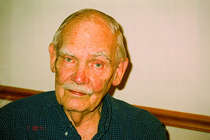About the Author
Frederik Pohl has been about everything that it is possible to be in the field of science fiction, from consecrated fan and struggling poet to critic, literary agent, teacher, book and magazine editor and, above all, writer.

Called by Kingsley Amis (in Amis's critical study of science fiction, New Maps of Hell) "the most consistently able writer science fiction, in its modern form, has yet produced," Frederik Pohl is clearly in the very first rank of writers in the field. He has won most of the awards the science-fiction field has to offer, including the Edward E. Smith and Donald A. Wollheim memorial awards, the International John W. Campbell award (twice), the French Prix Apollo, the Yugoslavian Vizija, the Nebula (three times, including the "Grand Master" Nebula for lifetime contributions to the field) and the Hugo (six times, he is the only person ever to have won the Hugo both as writer and as editor), as well as such awards from sources outside the science-fiction community as the American Book Award, the annual award of the Popular Culture Association, and the United Nations Society of Writers Award. Other honors include election as a Fellow to both the British Interplanetary Society and the American Association for the Advancement of Science.
Apart from the field of science fiction,
he is a noted lecturer and teacher in the area of future studies,
and is the author of, among other non-fiction works, Practical
Politics, a how-to-do-it manual of the American political process;
Our Angry Earth, on the world's environmental problems, written in
collaboration with the late Isaac Asimov, which Sir Arthur C.
Clarke calls "perhaps the most important book either of its authors
has produced"; and, most recently, Chasing Science, on the uses of
science as a spectator sport. He is also the Encyclopedia
Britannica's authority on the First Century A.D. Roman emperor,
Tiberius.
Many of Frederik Pohl's works have been
adapted for radio, television, or film, beginning with the two-part
Columbia Workshop of the Air version of the classic The Space
Merchants in 1953. In Europe, a number of his stories have been
televised by the BBC and his famous novella, "The Midas Plague,"
became a three-hour special on German television. The 1981 NBC
two-hour television film, The Clonemaster, was based on an original
concept of his; his award-winning novel, Gateway, has been
dramatized for live theatrical production; his novelette, "The
Tunnel under the World," became a feature film in Italy; and his
novels, Man Plus and Gateway, are currently in development in
America as feature films. (Gateway was also made into a computer
game under the title of "Frederik Pohl's Gateway" by Legend
Entertainment; a second game, "Gateway II: The Home World," was
released a year later.)
Among his most recent novels are The
World at the End of Time, Outnumbering the Dead, Stopping at
Slowyear, The Voices of Heaven, O Pioneer, and The Siege of
Eternity.
He has traveled widely, sometimes to lecture on behalf of the United States State Department (in places as widely separated as Singapore, New Zealand and most of the countries of both Eastern and Western Europe) or to attend international conferences on science or science fiction in places like the Republic of South Korea, Canada, the People's Republic of China, Australia, Brazil, the former Soviet Union, the former Yugoslavia, and most of Western Europe. He is a past president of both World SF and the Science Fiction Writers of America and is currently Midwest Area Representative to the Authors Guild, having served for nine years as a member of the Guild Council before moving to the midwest. He currently makes his home in Palatine, Illinois, with his wife, Dr. Elizabeth Anne Hull, who is a past president of the Science Fiction Research Association and a noted scholar in the field.